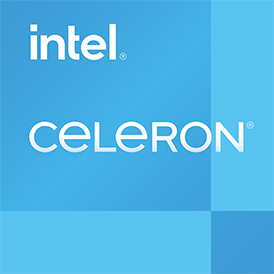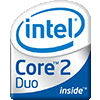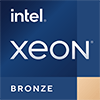
Intel Celeron N4000C Benchmark, Test and specs
Last updated:
The Intel Celeron N4000C was released in Q2/2019 and has 2 cores. The processor can process 2 threads simultaneously and uses a mainboard with the socket BGA 1090. In the Geekbench 5 benchmark, the Intel Celeron N4000C achieved a result of 440 points (single-core) or 755 points (multi-core).

| Name: | Intel Celeron N4000C |
|---|---|
| Family: | Intel Celeron (165) |
| CPU group: | Intel Celeron J4000/N4000/N5000 (11) |
| Architecture: | Gemini Lake |
| Segment: | Mobile |
| Generation: | 9 |
| Predecessor: | -- |
| Successor: | -- |
CPU Cores and Base Frequency
The Intel Celeron N4000C has 2 cores. The clock frequency of the Intel Celeron N4000C is 1.10 GHz (2.60 GHz). An initial performance assessment can be made using the number of CPU cores.
| CPU Cores / Threads: | 2 / 2 |
|---|---|
| Core architecture: | normal |
| Cores: | 2x |
| Hyperthreading / SMT: | No |
|---|---|
| Overclocking: | No |
| Frequency: | 1.10 GHz |
| Turbo Frequency (1 Core): | 2.60 GHz |
| Turbo Frequency (2 Cores): | 2.60 GHz |
Internal Graphics
The Intel Celeron N4000C has an integrated graphics that the system can use to efficiently play back videos. The Intel Celeron N4000C has the Intel UHD Graphics 600 installed, which has 12 streaming multiprocessors (96 shaders).
| GPU name: | Intel UHD Graphics 600 |
|---|---|
| GPU frequency: | 0.20 GHz |
| GPU (Turbo): | 0.65 GHz |
| Compute units: | 12 |
| Shader: | 96 |
| Hardware Raytracing: | No |
| Release date: | Q4/2017 |
| Max. displays: | 3 |
|---|---|
| Generation: | 9.5 |
| Direct X: | 12 |
| Technology: | 14 nm |
| Max. GPU Memory: | 8 GB |
| Frame Generation: | No |
Hardware codec support
Processors with integrated graphics can process video codecs faster. Support for modern codecs can significantly increase system efficiency during video playback.
| h265 / HEVC (8 bit): | Decode / Encode |
|---|---|
| h265 / HEVC (10 bit): | Decode / Encode |
| h264: | Decode / Encode |
| VP8: | Decode / Encode |
| VP9: | Decode / Encode |
| AV1: | No |
|---|---|
| AVC: | Decode / Encode |
| VC-1: | Decode |
| JPEG: | Decode / Encode |
Memory & PCIeThe Intel Celeron N4000C supports a maximum of 8 GB memory. Depending on the mainboard, the processor can use a maximum of 2 (Dual Channel) memory channels. This results in a maximum bandwidth of the main memory of 38.4 GB/s. |
|
| Memory type: | Memory bandwidth: |
|---|---|
| LPDDR4-2400 DDR4-2400 | 38.4 GB/s 38.4 GB/s |
| Max. Memory: | 8 GB |
| Memory channels: | 2 (Dual Channel) |
| ECC: | No |
| PCIe: | 2.0 x 6 |
| PCIe Bandwidth: | 3.0 GB/s |
Thermal ManagementThe Intel Celeron N4000C has a TDP of 6 W. Based on the TDP, the system manufacturer can and must adapt the cooling solution to the processor. |
|
|---|---|
| TDP (PL1 / PBP): | 6 W |
| TDP (PL2): | -- |
| TDP up: | -- |
| TDP down: | 4.8 W |
| Tjunction max.: | 105 °C |
Technical details
Modern production reduces the waste heat of a processor and increases its efficiency. The Intel Celeron N4000C is made in 14 nm and has 4.00 MB cache.
| Technology: | 14 nm |
|---|---|
| Chip design: | Monolithic |
| Socket: | BGA 1090 |
| L2-Cache: | -- |
| L3-Cache: | 4.00 MB |
| AES-NI: | Yes |
| Operating systems: | Windows 10, Windows 11, Linux |
| Virtualization: | VT-x, VT-x EPT, VT-d |
|---|---|
| Instruction set (ISA): | x86-64 (64 bit) |
| ISA extensions: | SSE4.1, SSE4.2 |
| Release date: | Q2/2019 |
| Release price: | -- |
| Part Number: | -- |
| Documents: | Technical data sheet |
Rate this processor
Benchmark results

The benchmark results for the Intel Celeron N4000C have been carefully checked by us. We only publish benchmark results that have been created by us or that have been submitted by a visitor and then checked by a team member. All results are based on and fullfill our benchmark guidelines.
Geekbench 5, 64bit (Single-Core)
Geekbench 5 is a cross plattform benchmark that heavily uses the systems memory. A fast memory will push the result a lot. The single-core test only uses one CPU core, the amount of cores or hyperthreading ability doesn't count.

|
AMD A8-5557M
4C 4T @ 3.10 GHz |
||

|
AMD Phenom II X4 965
4C 4T @ 3.40 GHz |
||

|
Intel Core2 Duo E8300
2C 2T @ 2.83 GHz |
||
|
|
Intel Celeron N4000C
2C 2T @ 2.60 GHz |
||

|
Intel Celeron N4000
2C 2T @ 2.60 GHz |
||

|
AMD Phenom II X4 970
4C 4T @ 3.50 GHz |
||

|
Intel Pentium E5800
2C 2T @ 3.20 GHz |
||
Geekbench 5, 64bit (Multi-Core)
Geekbench 5 is a cross plattform benchmark that heavily uses the systems memory. A fast memory will push the result a lot. The multi-core test involves all CPU cores and taks a big advantage of hyperthreading.
|
|
HiSilicon Kirin 650
8C 8T @ 2.00 GHz |
||

|
Intel Pentium E6600
2C 2T @ 3.06 GHz |
||

|
AMD Athlon II X2 250
2C 2T @ 3.00 GHz |
||
|
|
Intel Celeron N4000C
2C 2T @ 2.60 GHz |
||

|
AMD Athlon 5150
4C 4T @ 1.60 GHz |
||

|
Intel Pentium N3520
4C 4T @ 2.42 GHz |
||

|
AMD Opteron X3216
2C 2T @ 1.60 GHz |
||
Geekbench 6 (Single-Core)
Geekbench 6 is a benchmark for modern computers, notebooks and smartphones. What is new is an optimized utilization of newer CPU architectures, e.g. based on the big.LITTLE concept and combining CPU cores of different sizes. The single-core benchmark only evaluates the performance of the fastest CPU core, the number of CPU cores in a processor is irrelevant here.

|
Intel Core i3-2330M
2C 4T @ 2.20 GHz |
||

|
Qualcomm Snapdragon 820
4C 4T @ 2.15 GHz |
||

|
Samsung Exynos 9611
8C 8T @ 2.30 GHz |
||
|
|
Intel Celeron N4000C
2C 2T @ 2.60 GHz |
||

|
UNISOC T606
8C 8T @ 1.60 GHz |
||

|
Intel Celeron N4000
2C 2T @ 2.60 GHz |
||

|
Intel Pentium Silver N5000
4C 4T @ 2.70 GHz |
||
Geekbench 6 (Multi-Core)
Geekbench 6 is a benchmark for modern computers, notebooks and smartphones. What is new is an optimized utilization of newer CPU architectures, e.g. based on the big.LITTLE concept and combining CPU cores of different sizes. The multi-core benchmark evaluates the performance of all of the processor's CPU cores. Virtual thread improvements such as AMD SMT or Intel's Hyper-Threading have a positive impact on the benchmark result.

|
Intel Celeron 3755U
2C 2T @ 1.70 GHz |
||

|
Intel Atom x6414RE
4C 4T @ 1.50 GHz |
||

|
Intel Celeron N4000
2C 2T @ 2.60 GHz |
||
|
|
Intel Celeron N4000C
2C 2T @ 2.60 GHz |
||

|
Intel Pentium B940
2C 2T @ 2.00 GHz |
||

|
Intel Pentium E6600
2C 2T @ 3.06 GHz |
||

|
MediaTek MT8173
4C 4T @ 1.80 GHz |
||
iGPU - FP32 Performance (Single-precision GFLOPS)
The theoretical computing performance of the internal graphics unit of the processor with simple accuracy (32 bit) in GFLOPS. GFLOPS indicates how many billion floating point operations the iGPU can perform per second.

|
Intel Celeron N3350
Intel HD Graphics 500 @ 0.65 GHz |
||

|
Intel Celeron N4000
Intel UHD Graphics 600 @ 0.65 GHz |
||

|
Intel Celeron N4020
Intel UHD Graphics 600 @ 0.65 GHz |
||
|
|
Intel Celeron N4000C
Intel UHD Graphics 600 @ 0.65 GHz |
||
|
|
HiSilicon Kirin 955
ARM Mali-T880 MP4 @ 0.90 GHz |
||
|
|
HiSilicon Kirin 950
ARM Mali-T880 MP4 @ 0.90 GHz |
||
|
|
HiSilicon Kirin 810
ARM Mali-G52 MP6 @ 0.85 GHz |
||
Estimated results for PassMark CPU Mark
Some of the CPUs listed below have been benchmarked by CPU-monkey. However the majority of CPUs have not been tested and the results have been estimated by a CPU-monkey’s secret proprietary formula. As such they do not accurately reflect the actual Passmark CPU mark values and are not endorsed by PassMark Software Pty Ltd.

|
Intel Celeron N4000
2C 2T @ 2.60 GHz |
||

|
Intel Xeon E3-1220L v3
4C 8T @ 1.50 GHz |
||

|
Intel Core i7-2610UE
2C 4T @ 1.50 GHz |
||
|
|
Intel Celeron N4000C
2C 2T @ 2.60 GHz |
||

|
AMD GX-415GA
4C 4T @ 1.50 GHz |
||

|
Intel Pentium 2030M
2C 2T @ 2.50 GHz |
||

|
Intel Core i3-4012Y
2C 4T @ 1.50 GHz |
||
Cinebench R15 (Single-Core)
Cinebench R15 is the successor of Cinebench 11.5 and is also based on the Cinema 4 Suite. Cinema 4 is a worldwide used software to create 3D forms. The single-core test only uses one CPU core, the amount of cores or hyperthreading ability doesn't count.

|
AMD A12-9720P
4C 4T @ 3.60 GHz |
||

|
Intel Core i5-4200Y
2C 4T @ 1.90 GHz |
||

|
Intel Xeon E5-2690 v2
10C 20T @ 3.60 GHz |
||
|
|
Intel Celeron N4000C
2C 2T @ 2.60 GHz |
||

|
Intel Celeron N4020C
2C 2T @ 2.80 GHz |
||

|
Intel Celeron N4020
2C 2T @ 2.80 GHz |
||

|
Intel Xeon Bronze 3106
8C 8T @ 1.70 GHz |
||
Cinebench R15 (Multi-Core)
Cinebench R15 is the successor of Cinebench 11.5 and is also based on the Cinema 4 Suite. Cinema 4 is a worldwide used software to create 3D forms. The multi-core test involves all CPU cores and taks a big advantage of hyperthreading.

|
Intel Core i3-4020Y
2C 4T @ 1.50 GHz |
||

|
Intel Pentium N3510
4C 4T @ 2.40 GHz |
||

|
Intel Pentium N3700
4C 4T @ 2.40 GHz |
||
|
|
Intel Celeron N4000C
2C 2T @ 2.60 GHz |
||

|
Intel Celeron N4020C
2C 2T @ 2.80 GHz |
||

|
Intel Celeron N4020
2C 2T @ 2.70 GHz |
||

|
Intel Pentium N3520
4C 4T @ 2.42 GHz |
||
Benchmarks

Geekbench 5 (SC)
2,488 entries
2,488 entries

Geekbench 5 (MC)
2,461 entries
2,461 entries

Geekbench 6 (SC)
1,755 entries
1,755 entries

Geekbench 6 (MC)
1,703 entries
1,703 entries

FP32 SP (iGPU)
2,042 entries
2,042 entries

PassMark CPU-Mark
2,392 entries
2,392 entries

Cinebench R15 (SC)
1,106 entries
1,106 entries

Cinebench R15 (MC)
1,101 entries
1,101 entries
Popular comparisons
back to index









